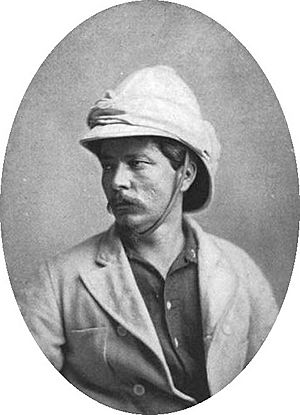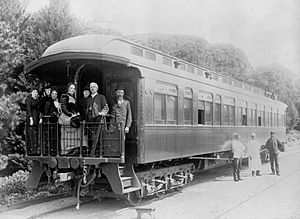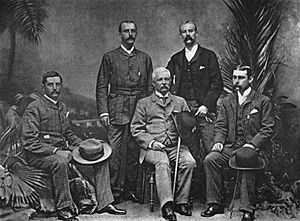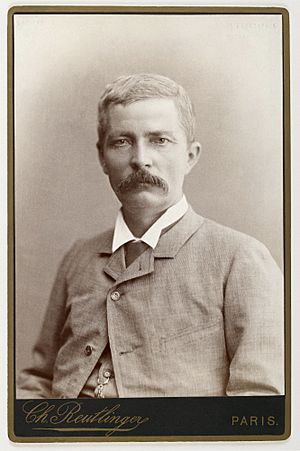Henry Morton Stanley facts for kids
Quick facts for kids
Sir Henry Morton Stanley
|
|
|---|---|

Journalist and explorer
|
|
| Born |
John Rowlands
28 January 1841 |
| Died | 10 May 1904 (aged 63) |
| Awards | Vega Medal (1883) |
| Signature | |
Sir Henry Morton Stanley (born John Rowlands; 28 January 1841 – 10 May 1904) was a Welsh journalist and explorer. He became famous for exploring central Africa and for finding the missionary and explorer David Livingstone.
When he found Livingstone, Stanley famously asked, "Dr. Livingstone, I presume?" Stanley is also known for searching for the source of the Nile River, exploring the Congo Basin, and leading the Emin Pasha Relief Expedition.
Some of Stanley's expeditions were known for harsh treatment of Africans. Despite this, he was highly admired and supported by the British and Belgian royal families. He was made a knight in 1899. Stanley was also a Member of Parliament for Lambeth North from 1895 to 1900.
Contents
Early life
Stanley never knew his father. His mother left him after he was born, which caused him sadness throughout his life.
He was raised by his grandfather, Moses Parry, who was a butcher. When John was five, his grandfather died. Stanley then stayed with relatives for a short time. Later, he was sent to the St. Asaph Union Workhouse for the Poor. This place was very crowded and had little supervision. Older boys often treated him badly there.
At age 18, in 1859, Rowlands moved to the United States. After the American Civil War, Stanley became a journalist. He reported on the expansion of the American West. In 1870, Stanley worked for the Herald newspaper. He traveled to the Middle East and the Black Sea region. He visited places like Egypt, Jerusalem, and India.
Finding David Livingstone
In 1869, the New York Herald newspaper gave Stanley a big task. He was told to find the Scottish missionary and explorer David Livingstone. Livingstone was known to be in Africa but had not been heard from for a while.
Stanley asked how much money he could spend on this mission. The newspaper told him to spend as much as needed to "FIND LIVINGSTONE!" Stanley had been asking his boss for years to let him go on this expedition.
Stanley found Livingstone on 10 November 1871. They met in Ujiji, which is near Lake Tanganyika in what is now Tanzania. Stanley may have greeted him with the famous words, "Doctor Livingstone, I presume?" However, some people think this line might not be true. Stanley tore out the pages from his diary that described this meeting.
Exploring the Congo River
In 1874, the New York Herald and Britain's Daily Telegraph paid for another expedition for Stanley. One of his main goals was to solve a big mystery about Africa. He wanted to trace the Congo River all the way to the sea. This journey was incredibly difficult.
Stanley used special boats that could be taken apart. He had to take the boats apart and carry them around huge waterfalls called cataracts. Then, he would rebuild them to travel on the next part of the river. After 999 days, on 9 August 1877, Stanley reached Boma. This was a Portuguese outpost about 100 kilometers from the mouth of the Congo River. He started with 356 people, but only 114 survived the journey. Stanley was the only European left. He wrote about his difficult experiences in his book Through the Dark Continent.
Working for the Belgian King
After his Congo expedition, King Leopold II of the Belgians contacted Stanley. Leopold was an ambitious king. In 1876, he set up a private company that looked like a scientific and charity group. He called it the International African Association.
The King said he wanted to bring Western civilization and religion to Africa. However, he secretly wanted to claim the lands for himself. Towards the end of his life, the King was unhappy that his Congo Free State became known for its harsh rule.
Emin Pasha Relief Expedition
In 1886, Stanley led the Emin Pasha Relief Expedition. The goal was to "rescue" Emin Pasha, who was the governor of Equatoria in southern Sudan. King Leopold II wanted Stanley to take a longer route through the Congo River. He hoped this would help him claim more land.
After facing huge difficulties and losing many lives, Stanley met Emin in 1888. During this expedition, he also mapped the Ruwenzori Range mountains and Lake Edward. Stanley, Emin, and their remaining followers came out of the interior at the end of 1890. This expedition caused some problems for Stanley's reputation. This was because of the bad behavior of some of the other Europeans on the trip.
Later years

When Stanley returned to Europe, he married an English artist named Dorothy Tennant. They adopted a child named Denzil. Denzil later gave about 300 items to the Stanley archives in Belgium.
Stanley became a member of Parliament. He represented Lambeth North from 1895 to 1900. He did not enjoy politics much and did not make a big impact in Parliament. He became Sir Henry Morton Stanley when he was made a Knight Grand Cross of the Order of the Bath in 1899. This was to recognize his service to the British Empire in Africa. In 1890, King Leopold II also gave him a high award called the Grand Cordon of the Order of Leopold.
Stanley died at his home in London on 10 May 1904. His grave is in the churchyard of St Michael and All Angels' Church in Pirbright, Surrey. His grave has a large piece of granite with the words "Henry Morton Stanley, Bula Matari, 1841–1904, Africa." "Bula Matari" means "Breaker of Rocks" or "Breakstones" in the Kongo language. It was a name given to Stanley by locals in Congo. It meant he was a strong leader who worked with laborers to break rocks. They used these rocks to build the first modern road along the Congo River.
Images for kids
-
Stanley's writing on a wall at Persepolis, Iran.
-
Henry Morton Stanley's grave in Pirbright, Surrey.
-
A memorial statue of H. M. Stanley in St Asaph.
See also
 In Spanish: Henry Morton Stanley para niños
In Spanish: Henry Morton Stanley para niños
 | Misty Copeland |
 | Raven Wilkinson |
 | Debra Austin |
 | Aesha Ash |













